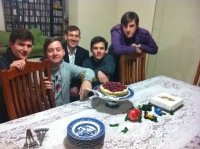Four Reasons to Quit School and Become a Teenage Homeschooler
"If you've spent your entire life in school (as most teenagers have), it's hard to imagine life without classes, grades, and curriculum. So when you try to imagine how homeschoolers learn, it's easy to think that they simply do "school" at "home."
While some traditionally-minded homeschoolers certainly feel compelled to pore over state-mandated textbooks in the comfort (and loneliness) of their houses, there are also many teenage self-directed learners who create their own curriculums based on their passions, interests, and goals. You're more likely to find these teens interning for a cool company, road-tripping with friends, or building a garden than doing textbook problem sets at home.
Some homeschoolers are so adamant about self-directed learning that they use an entirely different word to describe their approach: unschooling. The unschooling philosophy is simple: do what you love, and the learning (and eventually, money) will follow."





